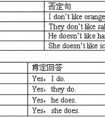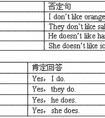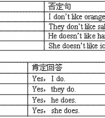用所给单词的适当形式填空。1. We ______ (fly) kites tomorrow.2. The girl is ______ (Daming) sister.-四年级英语
题文
| 用所给单词的适当形式填空。 |
| 1. We ______ (fly) kites tomorrow. 2. The girl is ______ (Daming) sister. |
答案
| 1. will fly/ are going to fly 2. Daming's |
据专家权威分析,试题“用所给单词的适当形式填空。1. We ______ (fly) kites tomorrow..”主要考查你对 一般将来时,名词所有格 等考点的理解。关于这些考点的“档案”如下:
一般将来时名词所有格
考点名称:一般将来时
一般将来时:
表示将来某个时间要发生的动作或存在的状态,也表示将来经常或反复发生的动作。
由“助动词will+动词原形”构成。“be going to+动词原形”结构是将来时的另一种形式,表示将要发生的事或者事先经过考虑打算去做某事。
例:We will go to Shanghai next year. 明年我们要去上海。
We are going to have a football match tomorrow. 我们明天要举行一场足球比赛。
Tom is going to have a bath. 汤姆要去洗澡了。一般将来时常见结构:
1、will / shall + 动词原形(否定句在will/shall后加not)
will 常简略为 'll,并与主语连写在一起,如: I'll,she'll,he'll,it'll,we'll,you'll,they'll。
一般疑问句如用will you…?其简略答语须是Yes,I will或 No,I won't;如用 Shall I…?(较少见)其简略答语须是 Yes,I shall.或 No, I shall not.
这种方法一般单纯地表示将来某个时间将要发生的动作或存在的状态。will用于各种人称;shall只用于第一人称。 例如 :
I will / shall go to visit him next week. 下周我将去拜访他。
What time shall we go there tomorrow? 明天我们几点去那儿?
2、be going to 动词原形
be going to 相当于一个助动词(其中be有人称和数的变化),与它后面的动词原形一起构成谓语。用来表示近期将要发生的动作以及计划、安排和打算要做的事。例如:
There is going to be a football match this afternoon.今天下午将有一场足球赛。
I‘m going to go to the park. 我将要去公园。
常用结构:
1、用于"I expect, I'm sure, I think, I wonder宾语从句"中。
Don't worry about the exam. I'm sure you'll pass.
不要担心这次考试,我确信你会通过的。
2、用于祈使句和陈述句中。
Work hard and you will succeed.
如果你努力,就会成功的。
3、与表示时间或条件的状语从句连用。
I'll let you know as soon as he arrives.
他一到我就通知你。- be going to与will的区别:
be going to与will两者都可表示将要发生的事、将要去做某事,但它们有如下几点区别:
1. be going to 表示近期、将要发生的事情,will 表示的将来的时间则较远一些,如:
He is going to write a letter tonight.
He will write a book one day.
2. be going to 表示根据主观判断将来肯定发生的事情,will表示客观上将来势必发生的事情。
He is seriously ill. He is going to die.
He will be twenty years old.
3. be going to 含有“计划,准备”的意思,而 will 则没有这个意思,如:
She is going to lend us her book.
He will be here in half an hour.
4.在有条件从句的主句中,一般不用 be going to, 而多用will, 如:
If any beasts comes at you, I'll stay with you and help you
注意
be going to和will在含义和用法上稍有不同。be going to往往表示事先经过考虑的打算;will多表示意愿,决心。两者有时不能互换。如:
She is studying hard and is going to try for the exams.她正努力学习并尝试参加考试。(is going to不能用will替换) - 一般将来时一般用法:
(1)一般将来时表示将要发生的动作或情况。
例如:I will(shall) arrive tomorrow.我明天到。(主语是第一人称时最好用shall)
Will you be free tonight? 你今晚有空吗?
We won’t (shan’t) be busy this evening. 我们今晚不忙。
(2)在一般将来时的句子中,有时有表示将来时间的状语,有时没有时间状语,这时要从意思上判断是否指未来的动作或情况。例如:
Will she come? 她(会)来吗?
(3)在以第一人称I或we作主语的问句中,一般使用助动词shall,这时或是征求对方的意见,或是询问一个情况(b):
a. Where shall we meet? 我们在哪儿碰头?
b. Shall we have any classes tomorrow?明天我们有课吗?
在这类问句中,近几年来也有不少人用will,特别是在美国。例如:
How will I get there? 我怎么去?
(4)be going to+ 动词原形
a.表示计划、打算、准备做的事。例如:
We are going to put up a building here.我们打算在这里盖一座楼。
How are you going to spend your holidays?假期你准备怎样过?
b.表示即将发生或肯定要发生的事。例如:
I think it is going to snow. 我看要下雪了。 - 常用时间状语:
1)tomorrow,the day after tomorrow,tomorrow morning/afternoon/evening
2)next year/week/month/hour/day/century
3)in+一段时间
4)in the future
5)this afternoon/Sunday/evening
6)from now on
7)one day,someday (未来的)某天
8)soon
考点名称:名词所有格
- 名词所有格:
表示有生命的东西的名词及某些表示时间、距离、星球、世界、国家等无生命的东西的名词后加’s来表示所有关系,叫做名词所有格。
例如:men’sroom男厕所
ChairmanMao’sworks毛主席著作
amile’sdistance一英里的距离
astone’sthrow一步之遥
themoon’slight月光
但如果该名词是以-s或-es接尾,则只在该名词后加“’”来构成所有格。
例如:3hours’walk三小时的路程
fiveminutes’walk五分钟路程
twomiles’distance两英里的距离 名词所有格用法:
一、’s所有格用法:
1)以s结尾的复数名词直接加“ ' ” 其余加“ 's ”
2)以s结尾的人名加“ ' ”或加“ 's ”
例如:Have you read Robert Browning’s poems?你读过罗伯特-勃郎宁的诗吗?二、of 所有格用法:
凡不能加’s的名词,都可以与of构成短语,来表示所有关系。无生命名词的所有格也可以这么用。
例如:Does anyone know the title of the novel?有谁知道这部小说的名字?
There is a tall maple tree at the end of the road.在这条路的尽头有一棵高高的枫树。
但有特殊情况:
This is a photo of my parents.
如果名词后面有一个较长定语,尽管名词表示有生命的东西,也可以用这种所有格形式。
例如:Did you listen to the speech of the President Clinton over the radio?你听了克林顿总统的广播讲话了吗?
They have the support of the people of the developing countries.他们得到发展中国家人民的支持。三、双重所有格:
所谓“双重所有格(double genitive)”,是指名词所有格或名词性物主代词同of构成的所有格,即“of+名词所有格”。
双重所有格有以下几个特征:
1)“of+名词所有格”中的名词必须表示人,不能表示事物。因此,我们可以说:
a play of Shakespeare’s(莎士比亚的一个戏剧), a friend of my wife’s(我妻子的一个朋友),但却不能说a funnel of the ship’s或 a leg of a table’s,
- 最新内容
- 相关内容
- 网友推荐
- 图文推荐
| [家长教育] 孩子为什么会和父母感情疏离? (2019-07-14) |
| [教师分享] 给远方姐姐的一封信 (2018-11-07) |
| [教师分享] 伸缩门 (2018-11-07) |
| [教师分享] 回家乡 (2018-11-07) |
| [教师分享] 是风味也是人间 (2018-11-07) |
| [教师分享] 一句格言的启示 (2018-11-07) |
| [教师分享] 无规矩不成方圆 (2018-11-07) |
| [教师分享] 第十届全国教育名家论坛有感(二) (2018-11-07) |
| [教师分享] 贪玩的小狗 (2018-11-07) |
| [教师分享] 未命名文章 (2018-11-07) |





![Sue ____________ agoodmovienextweek.[ ]A.seesB.sawC.willsee-六年级英语](http://www.00-edu.com/d/file/ks/4/1/53/2019-08-24/small05342db0dbc0986b364ddef33f8616821566592176.jpg)
